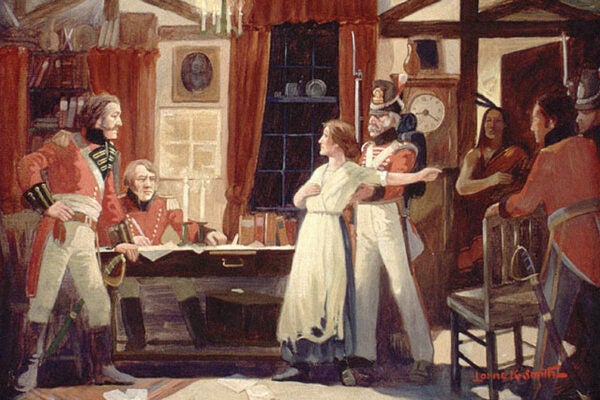The period of the early American Republic, from 1776 to 1800, saw an economic crisis as fraught as the Great Depression. There was an estimated 20 percent drop in real per capita income from the Revolution to the election of Thomas Jefferson, writes scholar John Mac Kilgore. But powerful speculators had made a killing. Their friends, the Federalist presidents George Washington and John Adams, with Alexander Hamilton behind them, seemed to be consolidating an elitist republic, with a strong state working hand-in-hand with private financiers. Was this the democracy the Revolution had been fought for?
A Scottish immigrant to Philadelphia named John Lithgow thought not. Writing to Washington in 1796, he argued that a strategy of inequality—which is how he saw Federalist policy—would inevitably lead to tyranny by those protecting their loot: “where Money is, there Power will find its Center.”
Half a dozen years later, in 1802, Lithgow anonymously published a groundbreaking work criticizing economic inequality and what Mac Kilgore describes as the “democratic limits of republicanism at the core of the US national project.” Lithgow’s Equality—a Political Romance was utopian fiction, “the first of its kind written in the United States,” with a very real political point.
In the book, writes Mac Kilgore, “Lithgow offers another prospect for the United States, one adhering to a belief in cooperative society based on progressive industrialization; collective ownership; and political, social, and economic egalitarianism.”
Though clothed in the convention of an island utopia, Equality was very much about current conditions. Not only was it an expression of Lithgow’s “commitment to concrete political activism,” it was also “his speculative vision of an anticapitalist future as the ultimate promise and logical extension of the US democratic experiment.”
In Equality‘s time, however, “the dominant forces at work in the early Republic willfully opposed” and contended with Lithgow and his like-minded allies. Lithgow was a part of “an influential group of emigre reformers and publishers who led the democratic republican movement” against the Federalists. Like Lithgow himself, many were affiliated with the United Irishmen, a movement that had been inspired by the French Revolution.
The Federalist press was uncompromising in its attacks against such radical voices. Lithgow and his ilk fought back just as vigorously, in the newspapers and pamphlets that made up contemporary media.
Nevertheless, radicals helped Thomas Jefferson and the Democratic-Republicans defeat the Federalists in the election of 1800. Then “the increasingly centrist party of Jefferson alienated the left-wing republicans who helped bring it to power and squelched the public discourse of radicalism in the process.”
Equality the tract would be set aside. But what form of government can best “diffuse enjoyments, rational and substantial enjoyments, among the greatest number of citizens,” as Lithgow asks? More than two centuries later, when vast inequality of wealth and political power are again topics of the moment, the question stands.







